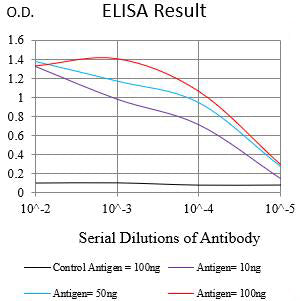
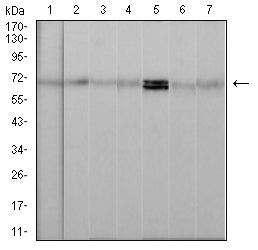
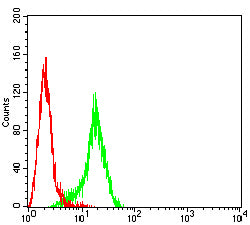
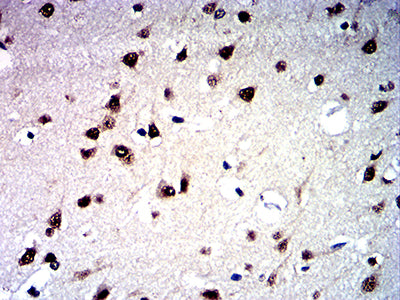
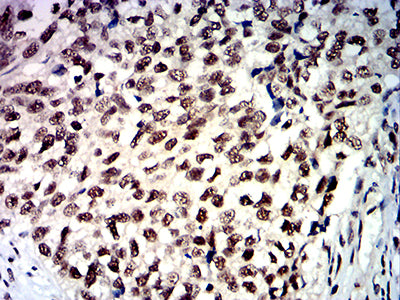
| WB | 咨询技术 | Human,Mouse,Rat |
| IF | 咨询技术 | Human,Mouse,Rat |
| IHC | 1/200 - 1/1000 | Human,Mouse,Rat |
| ICC | 技术咨询 | Human,Mouse,Rat |
| FCM | 1/200 - 1/400 | Human,Mouse,Rat |
| Elisa | 1/10000 | Human,Mouse,Rat |
| Aliases | HD1; RPD3; KDAC1; GON-10; RPD3L1 |
| Entrez GeneID | 3065 |
| clone | 1B6A7 |
| WB Predicted band size | 55.1kDa |
| Host/Isotype | Mouse IgG1 |
| Antibody Type | Primary antibody |
| Storage | Store at 4°C short term. Aliquot and store at -20°C long term. Avoid freeze/thaw cycles. |
| Species Reactivity | Human, Mouse, Rat |
| Immunogen | Purified recombinant fragment of human HDAC1 (AA: 321-482) expressed in E. Coli. |
| Formulation | Purified antibody in PBS with 0.05% sodium azide |
+ +
以下是关于HDAC1抗体的3篇参考文献及其摘要概括:
---
1. **文献名称**:*HDAC1 links early life stress to impaired synaptic plasticity and depression*
**作者**:J. F. Covington III et al.
**摘要**:该研究通过免疫印迹(Western blot)和免疫组化(IHC)分析,发现HDAC1在小鼠海马体中的表达与早期压力诱导的突触可塑性损伤相关。研究使用特异性HDAC1抗体证实其参与表观遗传调控,并关联抑郁症的分子机制。
2. **文献名称**:*Selective inhibition of HDAC1 activates SOX2-mediated enhancer to reprogram fibroblast into neural stem cell*
**作者**:Y. Li et al.
**摘要**:本文利用HDAC1特异性抗体进行染色质免疫沉淀测序(ChIP-seq),揭示了HDAC1通过调控SOX2增强子区域抑制成纤维细胞向神经干细胞的转化。研究强调了HDAC1在细胞重编程中的关键作用。
3. **文献名称**:*HDAC1 modulates OGG1-mediated oxidative DNA damage repair*
**作者**:M. A. Hassan et al.
**摘要**:通过免疫共沉淀(Co-IP)和免疫荧光技术,研究发现HDAC1与DNA修复酶OGG1相互作用。使用HDAC1抗体阻断其活性后,氧化损伤修复效率显著下降,表明HDAC1在DNA损伤应答中的表观遗传调控功能。
---
以上文献均通过HDAC1抗体进行功能研究,涵盖神经科学、细胞重编程和DNA修复等领域。如需扩展检索,可结合抗体货号(如Abcam#ab7028)或特定实验方法筛选更多研究。
Histone deacetylase 1 (HDAC1) is a critical enzyme involved in epigenetic regulation, primarily functioning to remove acetyl groups from histone proteins, thereby promoting chromatin condensation and transcriptional repression. As a member of the class I HDAC family, HDAC1 is ubiquitously expressed and localizes to the nucleus, where it interacts with multiprotein complexes like Sin3. NuRD, and CoREST to regulate gene expression. It plays essential roles in cell cycle progression, differentiation, DNA repair, and tumor suppression, with dysregulation linked to cancers, neurodegenerative disorders, and inflammatory diseases.
HDAC1 antibodies are indispensable tools for studying its expression, localization, and molecular interactions. These antibodies are widely used in techniques such as Western blotting, immunoprecipitation, chromatin immunoprecipitation (ChIP), and immunofluorescence to investigate HDAC1's role in chromatin remodeling and post-translational modifications. Specific HDAC1 antibodies help distinguish it from other HDAC isoforms, enabling precise analysis of its functional contributions in diverse pathways. Researchers also utilize these antibodies to explore the therapeutic potential of HDAC inhibitors in cancer and neurological conditions. Validation of HDAC1 antibodies typically includes knockout cell lines or tissues to confirm specificity. Both monoclonal and polyclonal variants are available, with selection depending on application requirements. Reliable HDAC1 antibodies remain vital for advancing research in epigenetics and targeted drug development.
×